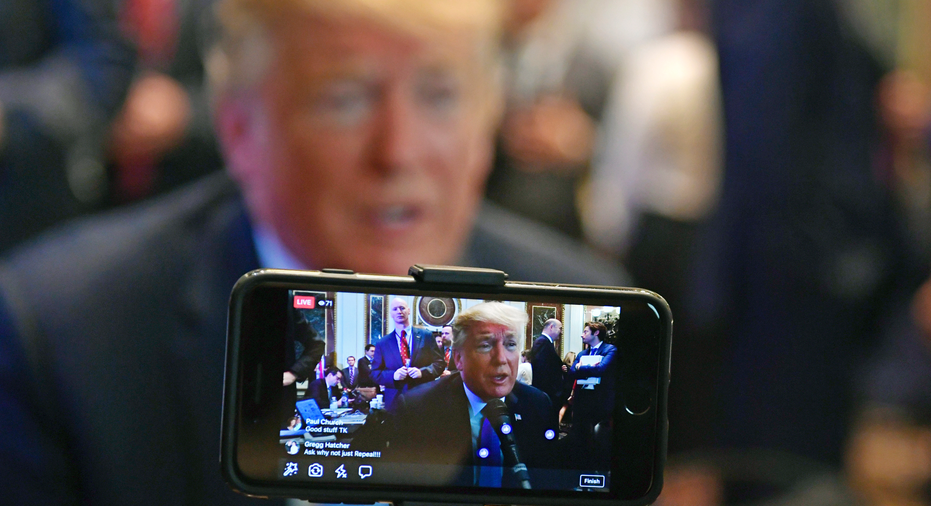The Latest: Senators announce plan for insurance markets

WASHINGTON – The Latest on Congress and health care legislation (all times local):
11:50 p.m.
President Donald Trump is backing away from his positive response to a bipartisan Senate proposal to stabilize health insurance markets unsettled by his order to end "Obamacare" low-income subsidies.
Speaking in the Rose Garden, Trump had called the deal reached by Republican Sen. Lamar Alexander of Tennessee and Democratic Sen. Patty Murray of Washington "a short term solution." But hours later the White House said Trump is supportive of efforts to seek a solution but opposes the Alexander-Murray plan.
___
6 p.m.
Republican and Democratic senators have announced a plan aimed at stabilizing America's health insurance markets in the wake of President Donald Trump's order to terminate "Obamacare" subsidies.
Trump himself has spoken approvingly of the deal, but some conservatives are denouncing it as an insurance company bailout.
Health insurance markets have been in limbo following GOP failures to repeal and replace the Affordable Care Act. Trump announced last week that he would end monthly "cost sharing reduction" payments the government makes to help insurance companies reduce costs for lower-income people.
The deal negotiated by Republican Sen. Lamar Alexander of Tennessee and Democratic Sen. Patty Murray of Washington would continue the insurer payments for two years, while establishing new flexibility for states.
__
2:30 p.m.
President Donald Trump is expressing support for an agreement struck by two leading lawmakers to extend federal payments to health insurers.
Trump spoke at a news conference in the Rose Garden Tuesday with the Greek Prime Minister. He commented after Sen. Lamar Alexander of Tennessee told reporters that he and a top Democrat have reached an agreement on a plan to extend the federal payments that Trump has blocked.
Trump says the White House has been involved in what he calls a "short-term deal." He said he still thinks a system where funding is given to states through federal block grants is the best long-term plan.
__
2:10 p.m.
A leading Republican senator says he and a top Democrat have reached an agreement on a plan to extend federal payments to health insurers that President Donald Trump has blocked.
GOP Sen. Lamar Alexander of Tennessee tells reporters that the next step will be for him and his negotiating partner — Democrat Patty Murray — to win enough support from colleagues to push it through Congress.
Earlier, Alexander said in an interview that he was nearing agreement with Murray to continue federal payments to insurers for two more years. In exchange, Republicans want Congress to give states flexibility to avoid some coverage requirements under President Barack Obama's health care law.
Trump halted the insurers' payments last week, but has said he wants a bipartisan deal to continue them temporarily.
__
2:05 p.m.
President Donald Trump says so-called "Obamacare" is "everything but dead."
Trump spoke in the Rose Garden Tuesday at a joint press conference with the Greek prime minister.
Trump again asserted with no evidence that the votes are there now to repeal the law. He says a replacement would have the federal government turn over money for health care directly to states in the form of block grants.
The president says he wants to turn to health care after an effort to overhaul the nation's tax system.
Previous efforts to overhaul President Barack Obama's health care law repeatedly failed.
__
11:51 a.m.
Two leading senators say they have the "basic outlines" of a bipartisan deal to resume payments to health insurers that President Donald Trump has blocked. But Republican Sen. Lamar Alexander and Democrat Patty Murray say in brief interviews that they still have unresolved issues.
Alexander says the two bargainers are close to an agreement to continue federal subsidies to insurers for two years. Republicans want Congress to give states meaningful flexibility to ease coverage requirements under President Barack Obama's health care law.
Alexander says they still haven't agreed on what "meaningful" means.
The payments go to insurers for their costs for reducing out-of-pocket expenses for lower-earning customers.
Trump and many Republicans consider them bailouts to carriers. Insurers and others have warned premiums will rise unless the money is restored.



















